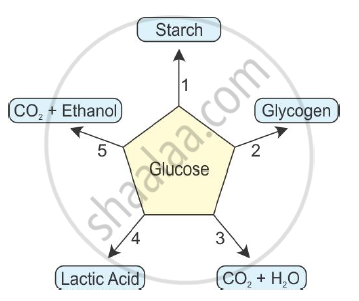Advertisements
Advertisements
प्रश्न
Describe the process of respiration in the following part of a plant:
Stem
उत्तर
The stems of herbaceous plants have stomata. The oxygen from air diffuses into the stem of a herbaceous plant through stomata and reaches all the cells, for respiration. The carbon dioxide gas produced during respiration diffuses out into the air, through the same stomata. In woody stems, the bark has lenticels for gaseous exchange.
APPEARS IN
संबंधित प्रश्न
Given below are the end products of different reactions involving glucose.

Write the reaction number in front of the following:
(i) Anaerobic reaction =
(ii) Reaction in the human muscles =
(iii) Aerobic respiration =
(iv) Reaction in the plant cells =
(v) Reaction in the liver
Cellular respiration takes place in
(a) Lysosome
(b) Chlorophyll
(c) Mitochondria
(d) Ribosome
Compare the functioning of alveoli in the lungs and nephrons in the kidneys with respect to their structure and functioning.
Trace the movement of oxygenated blood in the body.
Name the areas in a woody stem through which respiratory exchange of gases takes place.
Out of photosynthesis and respiration in plants, which process occurs:
(a) all the time?
(b) only at daytime?
In the lungs what substance is taken into the body?
Describe the process of respiration in the following part of a plant:
Leaves
Draw a labelled diagram of the human respiratory system.
In cockroaches, air enters the body through:
During the respiration of an organism A, 1 molecule of glucose produces 2 ATP molecules whereas in the respiration of another organism B, 1 molecule of glucose produces 38 ATP molecules.
(a) Which organism is undergoing aerobic respiration?
(b) Which organism is undergoing anaerobic respiration?
(c) Which type of organism, A or B, can convert glucose into alcohol?
(d) Name one organism which behaves like A.
(e) Name two organisms which behave like B.
When a person breathes in the air, the air enters into his body through an organ A having two holes B in it. The air then passes through the pharynx and larynx and enters into tube C. The tube C divides into two smaller tubes D at its lower end. The two smaller tubes are attached to two respiratory organs E. Each smaller tube divides inside the organs E to form a large number of still smaller tubes called F. The smallest tubes F have air-sacs G at their ends in which gaseous exchange takes place in the body of the person. What are A, B, C, D, E, F, and G?
Differentiate between
External respiration and Internal respiration
Name the body structure concerned with the given functional activity:
Prevents food from entering the trachea during swallowing.
Given below is an example of certain structure and its special functional activity:
"Kidney and excretion".
Fill in the blanks on a similar pattern.
Epiglottis and _____________.
Which of the following equations is the summary of photosynthesis?
Sometimes when we do heavy exercise, anaerobic respiration takes place in our muscle cells. What is produced during this process?
